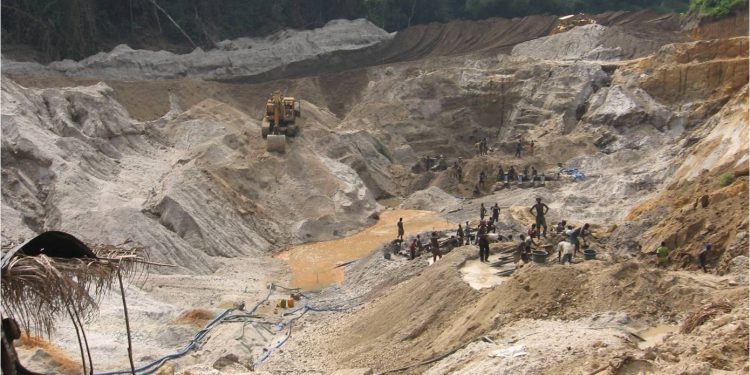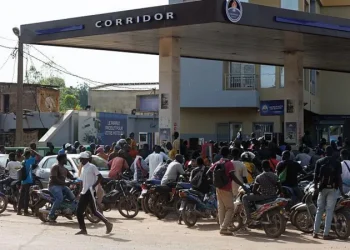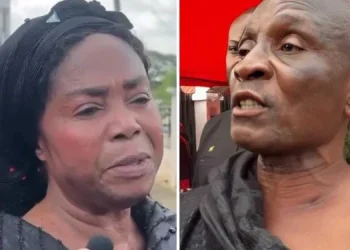BACKGROUND
Traditional mining has been the backbone of many local Ghanaian communities for centuries. Traditional mining was under the firm and strict control of local Kings and Chiefs who were the custodians of the land. Miners both local and foreign, paid taxes to these local authorities. Gold nuggets found after rains were presented to overlords. That placed gold mining under the direct control of the local people. It was jealously guarded and the trade was passed on from one generation to another. Proceeds were of traditional and economic significance.
It was done by digging pits, tunnels and sluices by hand and simple tools without or with less chemical use. The century old small scale mining was owned and ran by local authorities and people. Since the local authorities and people owned and controlled the concessions, they mined sustainably and cautiously. It was a great means of obtaining decent livelihood long before the advent of the Europeans on the Gold Coast. Traditional mining operations have created some of the largest handmade features on Earth, such as the Big Hole open pit mine in South Africa, which is claimed to be the largest hole on Earth excavated by hand.
However, with the advent of foreign involvement in illegal mining, there is upsurge in capital intensive equipment like Chang fans, excavators and pillagers.
ENORMITY OF THE MENACE
There is an estimated 20,000 to 50,000 illegal miners across the country. These groups of people are often from poor background or economically disadvantaged people. More than 50% of those engaged in illegal mining are the youth, women and children, arguably the highest in the world.
Illegal mining is extremely dangerous economic activity killing more than 10,000 over the last ten years directly and indirectly. A typical example of illegal accident happened on November 12, 2009 at Dompoase, killing 18, including 13 women serving as porters. Similar accident happened in July 2007, killing more than 10 illegal miners aside several others.
Illegal mining doesn’t just occupy the front pages of our newspapers or headlines of our news portals, it equally occupies the front-page of our minds as concerned Ghanaians generally. Illegal mining has wreaked massive havoc on our lives and environment than natural causes and other human factors such as bad farming practices.
Where is the roadmap after the six month reprieve?
Mining is not the problem, even nuclear weapons can be controlled and managed. There is poor management of the galamsey menace due to lax in the enforcement of environmental laws especially of EPA and the Mineral Commission. There is a general lack of education, environmental assessment cost, proper pricing of the minerals. Low pricing of our mineral resources reflects a general lack of generational thinking and cost benefit analysis. The pricing index should factor the environmental cost, opportunity cost to agriculture, human settlement, health hazards, and pollution of water bodies and destruction of aquatic life as well as cost to unborn generations.
On April 17, 2017, Hon John Peter Amewu launched the Multilateral Mining Integrated Project (MMIP) at Kwahu-Mpraeso to holistically tackle the menace of illegal mining and to bring sanity.
It was a three-prong approach including provision of law, enforcement and technology to ensure transparency and sustainability. In conjunction with the Minerals Commission of Ghana, it was conceived as a five year project seeking to involve all Ghanaians and stakeholders in the mining sector. Under which, it was promised that alternative livelihood involving cultivation of oil palm plantations at Prestea-Huni Valley and Dunkwa for galamseyers.
The picture changed with the emergence of the culture of greed and avarice as a new and strange culture emerged that suggests that honest and humane acquisition of wealth is backward and foolish. We’ve sold our conscience and for that matter our destiny to greed and Mammon. Profit motivation is the major justification and push factor in life today and not the collective good of society of mother Ghana. Upsurge in illegal mining activities calls for stricter regulations and bylaws but carefree and greedy attitudes of the average Ghanaian has made nonsense of any control mechanism.
Mining accounts for over 2% of Ghana’s GDP and employs over 1% of the labour force but the overall impact of mining activities is indescribable and devastating in terms of human capital, the environment and health hazards. Over one million people are directly involved in the illegal mining trade and even more are involved indirectly. According to the UN report on mining, every one miner affects about six other lives on the average.
Hindrances to the War against Galamsey:
No mutual commitment from policy makers.
No concern for the collective good of our own land.
Corruption among many law enforcers and policy makers and implementers.
Pressure from international partners and relationships
Bureaucracy and cost of obtaining license for mining
Widespread economic hardships and unemployment across board.
Finding Permanent Solutions to the Menace.
Local authorities and people should lead the way. Communal responsibility is key to fighting illegal mining and other illegal activities like lumbering, overgrazing by Fulani herdsmen and sand winning. We should get the local people involved if we are to succeed in dealing with the menace permanently.
Provision of alternative sources of livelihood to absorb all the people whose lives depend solely on mining. Until this is done every effort and commitment from government and stakeholders would be ad hoc and lame.
There should be more education and sensitization of the citizenry on the dangers associated with illegal mining including the use of mercury and cyanide. More education should be given to the local people involved especially on radio, TV, print media, schools, colleges, universities, churches mosques and communities. The dangers associated with galamsey should be highlighted and amplified. The Rambo style approach is a nonstarter.The people must see the need to safeguard their own environment and generations unborn.
Mutual commitment from all quarters to stop the menace across Ghana by all stakeholders including central government, parliament, local government authorities, security agencies, traditional and religious leaders and civil society organizations, professional bodies, NGOs, the media and most importantly all Ghanaians.
Reliable sources of funding for the integrated efforts aimed at at curbing the menace across board. Those caught perpetrating illegality in mining especially should be charged heavily and the funds set aside to finance the deployment of the security forces.
Regulate the importation and possibly criminalize the distribution and sale of toxic chemicals like mercury, lead and cadmium and heavy duty machinery like the excavators, Chang fans and dredgers among others.
Reform the licensing framework and regime by Minerals Commission, Environmental Protection Agency and the Ministry of Lands and Natural Resources to make it easier for people to obtain license for operations so that their activities could be monitored, checked and regulated with ease.
Foreign involvement and investment especially by the Chinese should not be entertained. No foreign involvement whatsoever should be the rule. Mining in Ghana should be owned, done and controlled by Ghanaians and Ghanaians alone.
Issues regarding mining should be divorced from politics and political expediency. Politicians often bow to pressure from voters from mining areas and their desire to satisfy illegal miners in order to win votes and political leaders’ involvement and interest in mining makes the fight an uphill one.
Criminalize the ownership and use of Chang fans, excavators and dredgers in mining. Alluvial mining should be prohibited forthright without further delay.
Licensed mining companies should be made responsible for the closure and securing abandoned sites or suffer heavy fines otherwise the fight against mining will be fruitless in the long run.
Investors, landowners, illegal miners and collaborators should all be dealt with in the fight against the galamsey menace. Use of brutal force doesn’t work because of local informants and bribery. All should come on board perpetrators, political, religious and traditional leaders and the people.
Prevention is key to dealing with the menace permanently.
There are enough existing structures, bylaws and regulations, what is left to be seen and done is strict enforcement and application of the law. No need for reinvented laws.
Processes in dealing with the problem permanently
Identification of the problem (dangers and challenges associated with the menace) leading suggested and proffered solutions then to the best way out (lasting solutions). The next stage involves implementation of the best way forward (execution) or plan of action followed by assessment of the implementation process then finally termination or repetition of the entire process to achieve sustainability and eradication.
Push factors:
Unbridled appetite for quick wealth and quick cash. Joblessness. Greed compelling us to sell our collective good future for a pittance even to our own disadvantage. Loose laws and their enforcement, harsh economic conditions, connivance of security agencies, complicity of political, religious and traditional leaders, entanglements in international relationships and agreements, lack of generational thinking, no patriotism and nationalism, winner takes all politics.
Debilitating effects of galamsey menace:
It hampers self-development and education of youth engaged in the trade. Health hazards posed by seepage and emission of poisonous chemicals like mercury, cadmium, lead and cyanide into water bodies and farmlands. These metallic and poisonous chemicals have devastating and long term effects on the central nervous system, deforestation, degradation and pollution.
Lasting solutions:
Real jobs for galamseyers and not cosmetic jobs. Restructuring our educational system from the basic to the senior high school levels. Build a stronger economy. Depolarization and depoliticization of the economy. Better conditions of service for workers. Concerted efforts on all fronts. Foreigners should be kicked out of the illegal mining business. Generational thinking and long lasting solutions. Engender nationalism and patriotism. Moral revolution and renewal. Strict application and enforcement of the laws and regulations on mining. Honest, firm and fair leadership, no double standards. Registration and regulation of all mining activities. No sale of concessions to the highest bidder. Bigger and multinational mining firms must strictly apply the local content law passed in 2013. Reforms of licensing framework.
There is no coordinated and concerted effort geared towards dealing with it currently. No alternative to galamsey in the communities where people have become accustomed to making a living out of galamsey. Proper structures and systems should be put in place to fight galamsey menace across the country. Short term, medium term and long term strategies and approaches. Galamsey operators are entrenched in the trade, invested a lot of resources, associated with easy gotten wealth, social vices, flagrant disregard for law and order. Rambo style approach isn’t the best way forward. Is it worth the exploitation of our mineral resources? We are mortgaging the future of unborn generations to satisfy today’s need. Greed and avarice must necessarily stop.
No money syndrome is partly attributable to galamsey menace and the unstable value of the cedis. Rise in armed robbery and social vices. Shrinking of the economy is inevitable in some respect.
One of the biggest threat to our national development drive and agenda is impulse living. We dare not live recklessly for only today by plundering at our convenience the precious seeds and resources for tomorrow’s fruitfulness and multiplication. If we are not ready to sacrifice in the interest of future generations, we should not be irresponsible and thoughtless enough to mortgage their future on the altar of greed and avarice. The least we can do is to build a formidable and enduring prosperous society worthy of heritage and legacy. Generations gone by handed over to us a nation though not wealthy in terms of the transient fantasies of glitter and gold but of immeasurable value and substance. Nananom aye ko, aduru me ne wo so … We shamelessly live in the pale shadow of a rich and enviable past.
We’re selling ourselves too cheaply to the rest of the world. We have cheapen ourselves for far too long. If there is one thing all Africans including Ghanaians have done successfully after national independence, it is the fact that we have failed to live responsibly. We have only proven to the rest of the world that we are woefully incapable of managing our own affairs. We have insulted ourselves repeatedly by our beggarly posture. Not only have we told Europe, America and Asia that we cannot make it without them but more so, we have accepted the fact that we are second class minds condemned to depend on the benevolence of others for survival. The favourable conditions and achievements of these advanced economies didn’t happen overnight; neither were we created by celestial beings having supernatural abilities but by average human beings who took their destinies into their own hands and refused to sit unconcerned or idle about. They thought, envisioned, planned and conscientiously worked to bring into reality their dreams and aspirations while we sat back with cup in hand waiting for manna to fall from heaven.



















































